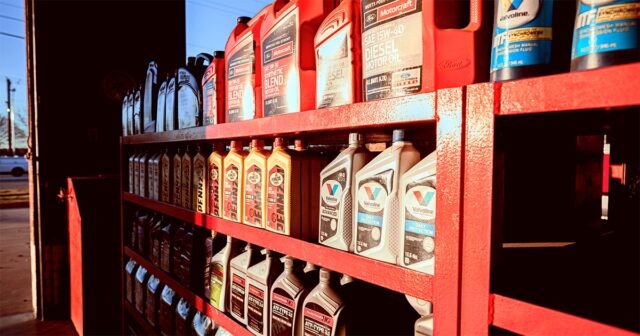Have you ever thought about what really keeps your engine working the way it should? It’s not just about mileage or how old your car is—your oil plays a huge part in overall performance. When it’s clean and changed on time, your engine stays protected. When it’s not, things can wear down faster than you’d expect.
In this post, we’re breaking down why regular oil changes are essential for engine health, how skipped changes affect performance, and what signs to watch for if your oil service is overdue. Keeping up with this simple service can make a big difference in how long your vehicle lasts and how well it runs.
What Happens When You Skip an Oil Change
Each time you drive, your engine produces heat, friction, and microscopic wear. Oil fluid is designed to manage these conditions by keeping internal components clean and lubricated. Over time, that same oil breaks down and collects debris from metal particles and fuel byproducts. Once the oil becomes too contaminated, it can no longer protect the engine properly.
Neglecting oil changes allows this buildup to continue circulating. This increases wear on components like pistons, camshafts, and bearings. You may not notice it immediately, but performance declines over time. Fuel economy often drops, engine temperature may rise, and internal parts begin to deteriorate faster than they would with fresh oil.
Oil that’s overdue for a change also puts more strain on your filter. Once the filter reaches its limit, it stops trapping contaminants effectively. That makes the oil even less capable of doing its job. Sticking to a schedule based on your vehicle’s mileage and oil type is the only way to prevent this kind of damage. It helps your engine stay efficient and reduces the risk of long-term mechanical failure.
The Payoff of Staying on a Maintenance Schedule
If you’ve ever pushed off an oil change longer than you meant to, you’re not alone. Most drivers don’t think much about oil changes until a light pops up or until something starts to make a noise or break down. However, staying consistent with this one task can make a huge difference. Here are just a few of the benefits you get when you stick to a consistent oil change schedule:
| Benefit | Why It Matters |
| Longer Engine Life | Clean oil reduces stress on internal parts, helping them last longer. |
| Better Fuel Efficiency | Fresh oil cuts down on friction, so your engine doesn’t work harder than it needs to. |
| Fewer Repairs | Clean oil keeps harmful buildup in check, lowering the risk of part failure. |
| Lower Engine Temps | Quality oil helps control heat and keeps temperature levels steady. |
| Consistent Performance | Engines run more smoothly when they’re properly lubricated and free of buildup. |
| Improved Resale Value | A well-maintained vehicle with service records tends to hold value better. |
The Real Consequences of Skipping Oil Changes
You might get lucky once and skip an oil change without noticing anything right away. But over time, letting it slide again and again starts to wear your engine down. Letting old oil sit in your engine for too long can lead to a chain of problems that gradually affect performance and reliability.
- Fuel economy starts to drop as the engine loses efficiency from increased internal friction.
- You may notice slower response or weaker acceleration as the oil fails to properly support moving parts.
- Wear on engine components increases, especially in areas that rely on consistent lubrication.
- Heat builds up faster, putting stress on systems that aren’t built to run that hot for long.
- Service lights may come on, triggered by oil quality sensors or engine performance issues.
- Thick sludge can start to form, clogging passageways and making it harder for oil to circulate.
- Expensive repairs become more likely, especially if key parts are damaged from lack of protection.
How to Tell If You’re Behind on an Oil Change
In many cases, your vehicle gives you a few signs, some more obvious than others. Paying attention to these signals can help you avoid damage and keep your engine performing as it should.
The Signs Most Drivers Notice First
The dashboard oil light is usually the first sign drivers see when it’s time for service. If it lights up or flashes while you’re driving, your car is alerting you to low oil pressure or poor oil quality. This shouldn’t be brushed off, even if the vehicle still feels like it’s running normally.
Mileage is another key factor. Most vehicles need an oil change between 3,000 and 7,500 miles, depending on your engine type and the oil used. If you’ve gone past that range without a service, it’s time to get one scheduled. It’s also worth checking the oil color and consistency on your dipstick; usually, dark, or gritty oil is a good indicator that it’s no longer doing its job effectively.
The Signs You’re Way Overdue for an Oil Change
If an oil change has been overdue for a while, your engine may start to show more noticeable symptoms. Knocking or ticking sounds when starting the car or while accelerating can signal that internal parts aren’t being lubricated properly. You might also notice reduced power or hesitation when accelerating; both signs indicate that the engine is working harder than it should.
A burning smell is another warning sign, which could mean that the oil is either breaking down or leaking onto hot components. In some cases, smoke from the tailpipe can also appear if oil is starting to burn. These symptoms are often a sign that the engine is under added stress and should be inspected as soon as possible.
Next Steps for Better Engine Health
Staying on top of regular oil changes is one of the easiest and most effective ways to protect your engine. It doesn’t take a big commitment, just consistency. Skipping one here and there might not cause immediate problems, but over time, the wear adds up. Clean oil keeps things running the way they should and helps prevent breakdowns, expensive repairs, and long-term damage.
If you’re not sure where you stand, checking in with a mechanic is a smart place to start. Whether you’re due for a change or just want to stay ahead of schedule, it’s worth getting on track. Here’s what you can do next:
- Check your mileage since your last oil change.
- Watch for dashboard lights or changes in vehicle performance.
- Look at the oil on your dipstick—dark or gritty oil needs to be replaced.
- Book an oil change if you’re unsure when your last one was.
- Schedule a vehicle inspection for peace of mind.
You can always stop by your local Kwik Kar for a quick oil change or full inspection. We’ll help you figure out what your car needs and get you set up with a schedule that works for you.





